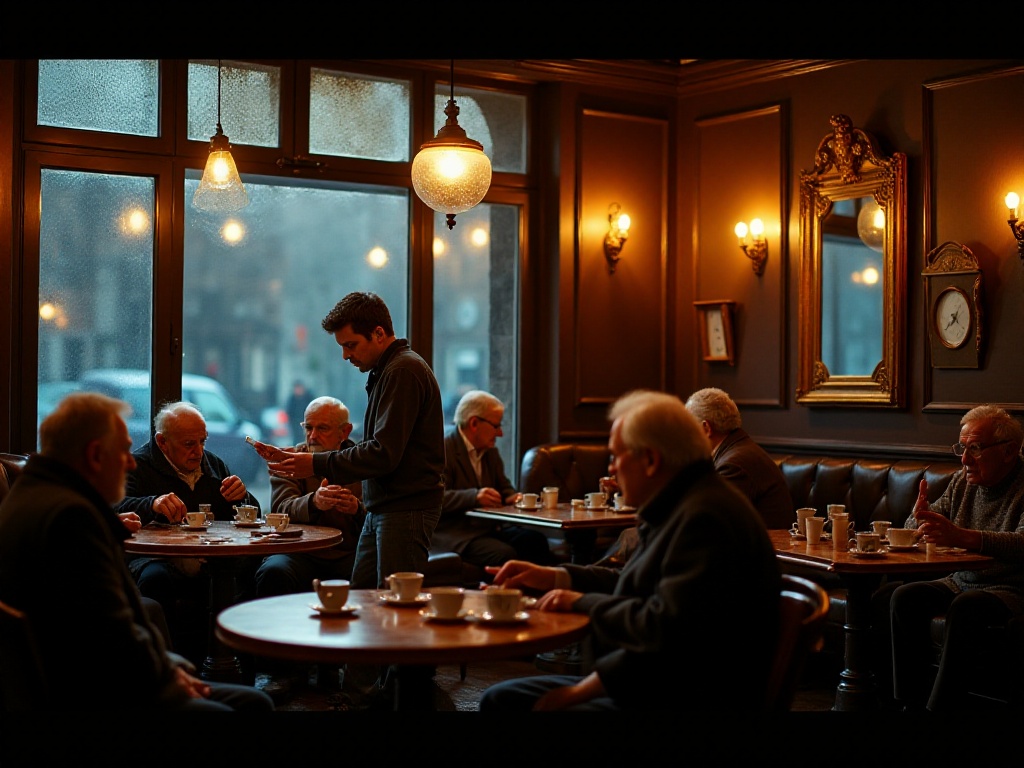Opening
Do you remember how nervous I was before my first international trip? As someone with just average language skills, I was really apprehensive about facing completely unfamiliar environments and languages. Now, as a travel blogger who has visited over 30 countries, I want to share a story that happened in Paris which completely changed my perspective on language learning.
An Unexpected Encounter
Last summer in Paris was sunny with gentle breezes. That day, I was wandering aimlessly in the Saint-Germain-des-Prés district, one of Paris's most artistic neighborhoods, filled with quaint shops and historic buildings. Following the enticing aroma of bread wafting through the air, I found myself in front of what looked like an authentic bakery. Honestly, my French was very basic - I only knew fundamental words like "Bonjour" and "Merci." But the smell was too tempting to resist, so I mustered up the courage to push open the door.
In France, especially in Paris, you might get the cold shoulder if you can't even manage basic courtesies. But I figured, since I was already there, I should be brave and try. When I opened the door, my heart was racing. However, what happened next completely surprised me.

The Turning Point
The elderly lady in the bakery was the most adorable French person I'd ever met! She wore a light blue apron, her hair neatly tied in a bun, with wrinkles full of warmth when she smiled. When I was gesturing wildly trying to say "I want a chocolate croissant," not only wasn't she impatient, but she smiled at me and used a particularly gentle voice to teach me how to say it in French, word by word.
"Pain au chocolat," she said slowly, carefully separating each syllable. I repeated after her several times until I got it right. The smile that lit up her face at that moment made me feel like I'd achieved something momentous. From that day on, I fell in love with this little shop and would visit daily. Sometimes to buy bread, sometimes just to learn some French from the elderly lady.
Deep Interaction
As time passed, I not only learned the French names for various breads but also met many local customers who regularly bought bread there. Interestingly, when they learned I was a foreigner trying to learn French, they all became extremely friendly. They would deliberately slow down their speech and use simple words to chat with me.
Once, a regular customer noticed my interest in croissants and told me about their history. Although I could only understand the general meaning, through his gestures and expressions, I learned that croissants were originally created to commemorate Austria's victory over Turkey. The bread's shape mimics the crescent on the Turkish flag - every bite contains a taste of history.
These daily exchanges, though simple - perhaps just talking about the weather, asking about work or weekend plans - provided me with the most authentic language practice opportunities. Through this process, I learned not just the language but also experienced French lifestyle and cultural characteristics.

Unexpected Gains
This experience made me deeply realize that the most effective way to learn a language is through real-life application. While textbook knowledge is important, without practical application, it's difficult to truly master a language. Research data from EF, an international language education institution, confirms this: students learning a language in the target country progress three times faster than those in traditional classroom settings.
This makes perfect sense because in the target country, you're forced to use the language. Even if you make mistakes, it doesn't matter - what's important is that you're trying to communicate. Moreover, when you're in a completely new language environment, your brain becomes more active, naturally improving learning efficiency.
Practical Suggestions
At this point, I'd like to share my experience on how to maximize language learning while traveling. First, preparation before departure is crucial. I suggest mastering at least 100 commonly used words and 10 basic sentence patterns. These basic vocabularies can help you handle most daily communication scenarios.
For example, in France, you should at least know how to say: "Bonjour" (hello), "S'il vous plaît" (please), "Merci" (thank you), "Au revoir" (goodbye) - these basic courtesies. Additionally, patterns like "Où est..." (where is...), "Je voudrais..." (I would like...) are very practical.
My suggestion is to spend 15 minutes daily practicing these basic vocabularies and sentence patterns. You can practice during your commute or before bed. Stick with it for a month, and you'll find you've mastered quite a considerable vocabulary.

Essential Tools
With today's advanced technology, there are all kinds of language learning tools available. I personally prefer using language learning apps because they gamify the learning process, making tedious memorization interesting. These apps also have voice recognition features that can help correct your pronunciation.
I often use these apps to learn the language of my destination, checking in daily. Research shows that tourists who prepare linguistically before travel have much better experiences than those who don't know the local language at all. This is completely understandable because when you can communicate basically in the local language, you not only better understand the local culture but also receive unexpectedly friendly treatment.
In-Depth Experience
If you want to learn a language more deeply, I strongly recommend participating in homestay programs. While this approach is more challenging, it's remarkably effective. Data shows that learners in homestay programs typically reach conversational level within 2-3 months, about 6 months faster than traditional language classrooms.
I have a friend who learned French through a homestay program. She lived with a French family for two months and was "forced" to speak French daily. While it was difficult at first, after two months, she could not only communicate fluently in French but also learned to make authentic French roasted chicken. This immersive learning environment allows you to master a language in the shortest time possible.

Cultural Perspective
When it comes to language learning, many might think mastering vocabulary and grammar is enough. But understanding cultural connotations is equally important. For instance, in France, polite expressions are particularly important. If you go to a bakery and just say "one croissant," it would seem rude. The correct way is to say "S'il vous plaît, je voudrais un croissant" (Please, I would like a croissant).
While these details might seem trivial, they reflect your respect for local culture. I've found that when I use polite French expressions, staff attitudes are noticeably different. They become more enthusiastic and sometimes even proactively introduce me to their daily specials.
Pitfall Guide
Speaking of using local languages abroad, there have been so many embarrassing moments. I remember once in a restaurant, I meant to say "Je suis satisfait" (I'm satisfied) but instead said "Je suis plein" (I'm full). In French, "plein" is more commonly used to describe animals being full and sounds crude when used for people. The server could barely contain their laughter, and although I felt a bit embarrassed at the time, I ended up laughing along.
Looking back now, these experiences are particularly interesting. Language learning is like this - you have to go through some embarrassment to improve. The important thing is not to let fear of making mistakes prevent you from speaking; treat every mistake as a learning opportunity.
Concluding Reflections
Looking back now, it was those awkward attempts that made my travels particularly memorable. Each attempt at language communication was an adventure outside my comfort zone. Through these experiences, I not only improved my language skills but more importantly, gained many sincere friendships.
The elderly lady from the bakery still messages me regularly, asking when I'll return to Paris. Every time I see her messages, I think of that sunny afternoon and the chocolate croissant that made me fall in love with French. This makes me more convinced that language isn't a barrier to travel, but rather a key to opening new worlds.

Action Suggestions
If you also want to improve your language skills while traveling, my advice is to start with the most basic daily expressions. Don't pressure yourself too much - even if you only know how to say "hello," "thank you," and "goodbye," it's better than knowing nothing. The important thing is to take the first step, and the rest will follow naturally.
I suggest starting practice with simple daily conversations, such as asking for directions, ordering food, and shopping scenarios. You can prepare some common phrases in advance, write them in your phone's notes, and check them when needed. Gradually, you'll find these sentences becoming more familiar and natural to say.
Future Outlook
In this era of globalization, mastering a foreign language is no longer just a personal hobby but an essential survival skill. The World Economic Forum predicts that by 2030, over 80% of global job positions will require mastery of at least one foreign language. While this number might sound intimidating, it also highlights the importance of language learning.
Rather than treating language learning as a chore, integrate it into your travels and naturally improve your language abilities while experiencing different cultures. Trust me, when you really start trying, you'll find the process much more interesting than you imagined.
Finally, I want to say that while there are no shortcuts in language learning, there's definitely a method that suits you. The important thing is to find the approach that keeps your enthusiasm for learning alive and stick with it. Perhaps one day, you too will find unexpected friendships in a strange city using broken foreign language skills.


